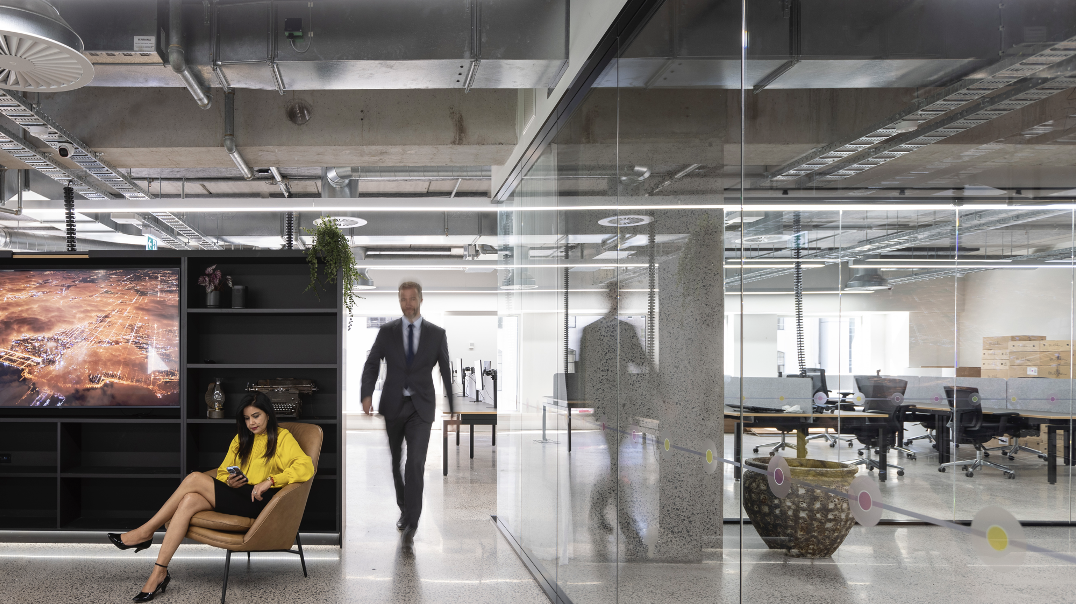As the modern workforce evolves, so do workplace preferences. By closely collaborating with existing tenants, Argosy gained insights into their business property aspirations. There is a growing demand for flexible workspaces that allow for scalability, reduced long-term capital investment and overall convenience. Recognising the need to offer more flexibility, Argosy has adapted a space in one of their iconic downtown buildings to create Footprint, a modern and vibrant co-working space.
In this article, we speak with Haley Jones, Manager Property Services, about co-working and what it delivers for tenants.
Q: What is co-working and how does it differ from traditional office setups?
Co-working spaces, sometimes referred to as shared office spaces, are flexible work environments where multiple businesses, entrepreneurs, and freelancers work alongside each other in a communal setting. Unlike traditional offices, these spaces offer more flexible occupancy terms, shared amenities and a collaborative atmosphere.
Q: How do potential clients benefit from co-working spaces?
Potential clients, especially startups and small businesses, find shared office spaces attractive because of their low barriers to entry. They can quickly establish a professional presence with minimal setup costs and administrative hassle. They also have access to a range of value-add share facilities. At Footprint these include board and meeting rooms, high-speed internet, teleconferencing facilities, bike storage and showers, kitchen and lounge facilities.
Q: How does co-working space support productivity, creativity and a sense of community?
Having a diverse community of professionals, from different industries, occupying a co-working space encourages cross-pollination of ideas and perspectives. Additionally, the dynamic environment and social interactions helps combat isolation and boost motivation.
Most co-working spaces incorporate communal areas suitable for networking events, workshops, and social gatherings that facilitate interaction among members. This sense of community fosters collaboration, knowledge sharing, and mutual support. Individuals can leverage these connections to expand their professional networks and gain valuable insights.
Q: What types of businesses are most suited to shared office spaces?
Co-working office spaces cater to a wide range of businesses, startups, freelancers, remote teams and satellite offices of larger companies. They are particularly beneficial for businesses that value flexibility, scalability, and opportunities for collaboration.
Q: What occupancy options are offered?
Co-working spaces typically offer a range of options. At Footprint we’ve looked to be as flexible as possible, offering services ranging from casual day and short-term arrangements, through to a dedicated desk and private team area. We have a range of meeting rooms, board room and breakout areas. Effectively, we work with tenants to tailor spaces to meet their specific needs – today and for the future.
Q: How do businesses know if a co-working space is right for them?
A business must consider their specific space requirements, budget, desired amenities, and company culture they want to create. Visiting potential co-working spaces, speaking with others working in the space, and reviewing the various types of occupation options available can provide insights into whether a particular office space is right for them.
Most co-working spaces have flexible arrangements meaning that potential tenants can try out a space before making a longer-term commitment.
Q: What trends do you see in the future of co working spaces?
The future of co-working spaces is likely to focus on integrating advanced technologies to enhance user experiences and operational efficiency. Additionally, there is a growing emphasis on sustainability and wellness initiatives. At Footprint we’re already incorporating these trends into our space and the services we offer. For example, the building has many green features and offers ‘end-of-journey’ facilities for those looking at more sustainable ways of getting to work.
Q: What makes Footprint Auckland’s best co-working space?
The three key things that make Footprint one of the best co-working spaces available in Auckland are:
- The space - The space itself is modern and well fitted out that has all the features and facilities of a productive and healthy workspace. It’s got a great vibe and energy that makes it an enjoyable place to work in.
- The occupancy options - The wide selection of occupancy options means we can meet people’s needs today while being flexible enough to adapt with them as their space requirements evolve over time.
- The location - Located in downtown Auckland means occupants enjoy the vibrant city atmosphere with easy access to trains, buses and ferries all nearby. City restaurants and bars, as well as shopping at Commercial Bay retail, are all within easy walking distance.
Footprint
Custom Street East
https://www.footprint.org.nz
Here are some interesting articles that talk about the benefits and considerations of co-working spaces:
Hadley C N, Marks B, Wright S (2023). HBR website: Research: How Co-working Spaces Impact Employee Well-Being, https://hbr.org/2023/02/research-how-coworking-spaces-impact-employee-well-being
Furchgott R (2023). New York Times website: https://www.nytimes.com/2023/05/31/business/co-working-spaces-corporate-workers.html


